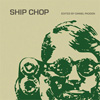 I've grown to expect unusual albums from Daniel Padden and this one did not disappoint me.  Much like Sublime Frequencies and Harappian Night Recordings, Ship Chop is the product of an omnivorous love of indigenous and exotic music from around the world: Padden took his favorite records and turned them into collage pieces that inventively combine previously unrelated cultures and sounds. Most remarkable about the album, however, is how exacting he was with his editing.  This easily could have been a murky and surreal miasma of overlapping recordings, but it isn't.  Instead, this album is surprisingly coherent, sharp, and hook-filled.  While there quite a few shorter pieces that are too brief to be satisfying, the handful of more extended songs are pretty unerringly excellent and it all forms a memorably warped whole.
I've grown to expect unusual albums from Daniel Padden and this one did not disappoint me.  Much like Sublime Frequencies and Harappian Night Recordings, Ship Chop is the product of an omnivorous love of indigenous and exotic music from around the world: Padden took his favorite records and turned them into collage pieces that inventively combine previously unrelated cultures and sounds. Most remarkable about the album, however, is how exacting he was with his editing.  This easily could have been a murky and surreal miasma of overlapping recordings, but it isn't.  Instead, this album is surprisingly coherent, sharp, and hook-filled.  While there quite a few shorter pieces that are too brief to be satisfying, the handful of more extended songs are pretty unerringly excellent and it all forms a memorably warped whole.
The first thing I realized as I listened to this album is that Daniel Padden has excellent and fascinating taste in music, but my second epiphany was that he approached this project in a surprisingly ego-free way.  A lot of the time, his editing is so subtle as to be unnoticeable.  Padden's aim was clearly not to dazzle the world with his clever juxtapositions or inventive layering.  Instead, Ship Chop unfolds like a very eccentric mixtape, recontextualizing many of Daniel's favorite snatches of music to heighten their impact and better illuminate their inherent beauty.  The opening piece ("Various Saints") is initially a perfect example of that non-intrusive approach, as something that sounds like a Chinese funeral march slowly segues into strangely ghostly whooping, but it ultimately morphs into a groove composed of heavily chopped chanting.  The second piece, "Flared Up By Love," is a bit less schizophrenic: it is essentially a repeating male vocal over a simple flute pattern and an African or Indian drum loop.  It all sounds perfectly coherent and natural together, but it is highly likely that none of those individual elements originate from the same country, culture, or time period.
As alluded to earlier, Padden's degree of inspiration is often in directional proportion to song length.  The album's centerpiece is the 9-minute "Dancer's Reverse," which weaves together an eerie kalimba-sounding motif with some of the most tortured and forlorn-sounding strings that I've ever heard (they sound like violins, but anything is possible on this album).  That's only the starting point though, as it eventually cycles through some quasi-religious chanting, rumbling drums, and bizarre cut-up loops.  That kalimba returns again in the album's other clear highlight (the uneasy "Belly of Parchment"), where it is beautifully coupled with blurred and subtly dissonant flutes. The violins come back in a great song too, sounding more tortured than ever in "Rattling Belts."  Notably, that same piece ultimately becomes one of the weirder and more disorienting stretches on the album once the crazed hooting, yelping, and loud false laughter comes in.
It is definitely the darker pieces that resonate most strongly with me, but they wouldn't be nearly as effective if the rest of the album were any less unpredictable and varied.  Padden and his unwitting collaborators cover pretty much the entire gamut of human emotion in just under an hour: joy, pain, celebration, religious ecstasy, humor–it's all here.  The magic lies in how compellingly and inventively Daniel is able to unfold his condensed abstract history of all humanity.  Sometimes the changes are startling and abrupt, but there are also many times where something initially comical or absurd (a strangled bagpipe-esque snippet) is used as the groundwork for something much deeper.  Notably, the album also highlights the fact that much of the music that I would classify as "experimental" these day falls within fairly limited parameters in regards to production, instrumentation, timbre, and the types of scales and melodies used.  Ship Chop sounds quite bold and unique amidst that context.  It has some missteps and compositional flaws, certainly (great parts end too quickly, some transitions are too jarring, etc.), but they don't ever stop the album from being a playful, bizarre, and mesmerizing experience.
Samples:
 
 
 
Read More


